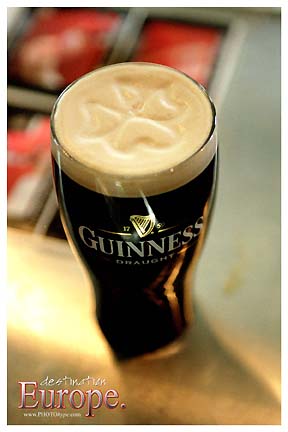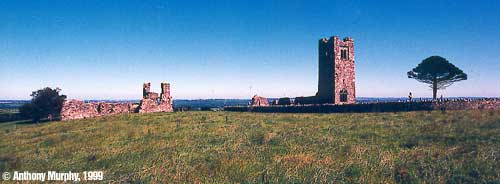| Author |
Message |
    
Barbara
Citizen
Username: Blh
Post Number: 632
Registered: 5-2001

| | Posted on Friday, March 17, 2006 - 4:10 am: | 



|
... when everyone is Irish!
May the road rise up to meet you.
May the wind be always at your back.
The rain falls soft upon your fields.
And until we meet again, may God hold you in the palm of His hand.
Barbara O' |
    
Scully
Citizen
Username: Scully
Post Number: 232
Registered: 8-2005
| | Posted on Friday, March 17, 2006 - 4:20 am: | 



|
Yes!!! Top of the day to all!!! |
    
Just The Aunt
Supporter
Username: Auntof13
Post Number: 4360
Registered: 1-2004

| | Posted on Friday, March 17, 2006 - 4:40 am: | 



|
 |
    
BGS
Citizen
Username: Bgs
Post Number: 774
Registered: 10-2003
| | Posted on Friday, March 17, 2006 - 5:57 am: | 



|
May the luck of the Irish be with all today!!
BG O'S |
    
O'Hero
Supporter
Username: Nohero
Post Number: 5199
Registered: 10-1999

| | Posted on Friday, March 17, 2006 - 8:00 am: | 



|
Top o' the mornin' to ya'. |
    
Lucy
Supporter
Username: Lucy
Post Number: 3173
Registered: 5-2005

| | Posted on Friday, March 17, 2006 - 8:18 am: | 



|
I hope all the Irish eyes are smiling have a brilliant day! |
    
Just The Aunt
Supporter
Username: Auntof13
Post Number: 4362
Registered: 1-2004

| | Posted on Friday, March 17, 2006 - 8:49 am: | 



|
 |
    
Pizzaz
Supporter
Username: Pizzaz
Post Number: 3330
Registered: 11-2001

| | Posted on Friday, March 17, 2006 - 9:52 am: | 



|
To all... Happy St. Paddy's day! 
|
    
Buzzsaw
Citizen
Username: Buzzsaw
Post Number: 4184
Registered: 5-2001

| | Posted on Friday, March 17, 2006 - 9:54 am: | 



|
 |
    
Pizzaz
Supporter
Username: Pizzaz
Post Number: 3332
Registered: 11-2001

| | Posted on Friday, March 17, 2006 - 10:27 am: | 



|
and a mighty fine day to you as well....
|
    
Just The Aunt
Supporter
Username: Auntof13
Post Number: 4365
Registered: 1-2004

| | Posted on Friday, March 17, 2006 - 10:51 am: | 



|
Pizzaz-
Are you going to have green pizza? |
    
Buzzsaw
Citizen
Username: Buzzsaw
Post Number: 4188
Registered: 5-2001

| | Posted on Friday, March 17, 2006 - 10:55 am: | 



|
oh no please don't have that.
but save me some corned beef for later on! |
    
Monster©
Supporter
Username: Monster
Post Number: 2524
Registered: 7-2002

| | Posted on Friday, March 17, 2006 - 12:01 pm: | 



|
The History of St. Patrick
http://www.st-patricks-day.com/index.asp
From The History Channel, http://www.historychannel.com/exhibits/stpatricksday/?page=history
The History of the Holiday
The First Parade
St. Patrick's Day is celebrated on March 17, his religious feast day and the anniversary of his death in the fifth century. The Irish have observed this day as a religious holiday for thousands of years.
On St. Patrick's Day, which falls during the Christian season of Lent, Irish families would traditionally attend church in the morning and celebrate in the afternoon. Lenten prohibitions against the consumption of meat were waived and people would dance, drink, and feaston the traditional meal of Irish bacon and cabbage.
The first St. Patrick's Day parade took place not in Ireland, but in the United States. Irish soldiers serving in the English military marched through New York City on March 17, 1762. Along with their music, the parade helped the soldiers to reconnect with their Irish roots, as well as fellow Irishmen serving in the English army.
Over the next thirty-five years, Irish patriotism among American immigrants flourished, prompting the rise of so-called "Irish Aid" societies, like the Friendly Sons of Saint Patrick and the Hibernian Society. Each group would hold annual parades featuring bagpipes (which actually first became popular in the Scottish and British armies) and drums.
No Irish Need Apply
Up until the mid-nineteenth century, most Irish immigrants in America were members of the Protestant middle class. When the Great Potato Famine hit Ireland in 1845, close to a million poor, uneducated, Catholic Irish began to pour into America to escape starvation. Despised for their religious beliefs and funny accents by the American Protestant majority, the immigrants had trouble finding even menial jobs. When Irish Americans in the country 's cities took to the streets on St. Patrick's Day to celebrate their heritage, newspapers portrayed them in cartoons as drunk, violent monkeys.
However, the Irish soon began to realize that their great numbers endowed them with a political power that had yet to be exploited. They started to organize, and their voting block, known as the "green machine," became an important swing vote for political hopefuls. Suddenly, annual St. Patrick's Day parades became a show of strength for Irish Americans, as well as a must-attend event for a slew of political candidates. In 1948, President Truman attended New York City 's St. Patrick's Day parade, a proud moment for the many Irish whose ancestors had to fight stereotypes and racial prejudice to find acceptance in America.
Wearing of the Green Goes Global
Today, St. Patrick's Day is celebrated by people of all backgrounds in the United States, Canada, and Australia. Although North America is home to the largest productions, St. Patrick's Day has been celebrated in other locations far from Ireland, including Japan, Singapore, and Russia.
In modern-day Ireland, St. Patrick's Day has traditionally been a religious occasion. In fact, up until the 1970s, Irish laws mandated that pubs be closed on March 17. Beginning in 1995, however, the Irish government began a national campaign to use St. Patrick's Day as an opportunity to drive tourism and showcase Ireland to the rest of the world. Last year, close to one million people took part in Ireland 's St. Patrick's Festival in Dublin, a multi-day celebration featuring parades, concerts, outdoor theater productions, and fireworks shows. |
    
McMem
Citizen
Username: Mem
Post Number: 5896
Registered: 5-2001

| | Posted on Friday, March 17, 2006 - 1:05 pm: | 



|
Happy New Year! |
    
Tommy O'Reingold
Supporter
Username: Noglider
Post Number: 13025
Registered: 1-2003

| | Posted on Friday, March 17, 2006 - 1:16 pm: | 



|
Happy Easter to all of ya!
|
    
Buzzsaw
Citizen
Username: Buzzsaw
Post Number: 4191
Registered: 5-2001

| | Posted on Friday, March 17, 2006 - 1:22 pm: | 



|

Happy Birthday ! |
    
O'Dave
Supporter
Username: Dave
Post Number: 8907
Registered: 4-1997

| | Posted on Friday, March 17, 2006 - 1:37 pm: | 



|
On March 17, 1901, paintings by the late Dutch painter Vincent van Gogh are shown at the Bernheim-Jeune gallery in Paris. The 71 paintings, which captured their subjects in bold brushstrokes and expressive colors, caused a sensation across the art world. Eleven years before, while living in Auvers-sur-Oise outside Paris, van Gogh had committed suicide without any notion that his work was destined to win acclaim beyond his wildest dreams. In his lifetime, he had sold only one painting. One of his paintings--the Yasuda Sunflowers--sold for just under $40 million at a Christie's auction in 1987.
Born in Zundert in the Netherlands in 1853, van Gogh worked as a salesman in an art gallery, a language teacher, a bookseller, and an evangelist among Belgium miners before settling on his true vocation as an artist. What is known as the "productive decade" began in 1880, and for the first few years he confined himself almost entirely to drawings and watercolors while acquiring technical proficiency. He studied drawing at the Brussels Academy and in 1881 went to the Netherlands to work from nature. The most famous work from the Dutch period was the dark and earthy The Potato Eaters (1885), which showed the influence of Jean-Franıois Millet, a French painter famous for his peasant subjects.
In 1886, van Gogh went to live with his brother, Thıo, in Paris. There, van Gogh met the foremost French painters of the postimpressionist period, including Henri de Toulouse-Lautrec, Paul Gauguin, Camille Pissarro, and Georges Seurat. He was greatly influenced by the theories of these artists and under the advice of Pissarro he adopted the kind of colorful palette for which he is famous. His painting Portrait of Pıre Tanguy (1887) was the first successful work in his new postimpressionist style.
In 1888, van Gogh, mentally exhausted and feeling he was becoming a burden on Thıo, left Paris and took a house at Arles in southeastern France. The next 12 months marked his first great period, and working with great speed and intensity he produced such masterful works as his sunflower series and The Night Cafı (1888). He hoped to form a community of like-minded artists at Arles and was joined by Gauguin for a tense two months that culminated when van Gogh threatened Gauguin with a razor blade and then cut a piece of his own ear off. It was his first bout with mental illness, diagnosed as dementia.
Van Gogh spent two weeks at the Arles Hospital and in April 1889 checked himself into the asylum at Saint-Rımy-de-Provence. He stayed there for 12 months and continued to work between recurrent attacks. One of the great paintings from this period was the swirling, visionary Starry Night (1889). In May 1890, he left the asylum and visited Thıo in Paris before going to live with Paul-Ferdinand Gachet, a homeopathic doctor and friend of Pissarro, at Auvers-sur-Oise. He worked enthusiastically for several months, but his mental and emotional state soon deteriorated. In late July 1890, feeling that he was a burden on Thıo and others, he shot himself. He died two days later, on July 29, in the arms of his brother.
He had exhibited a few canvases at the Salon des Indıpendants in Paris and in Brussels, and after his death both salons showed small commemorative exhibits of his work. Over the next decade, a handful of other van Gogh exhibits took place, but it was not until the Bernheim-Jeune show in 1901 that he was recognized as a truly important painter. In subsequent decades, his fame grew exponentially, and today his paintings are among the most recognized works of art in the world. |
    
McMem
Citizen
Username: Mem
Post Number: 5898
Registered: 5-2001

| | Posted on Friday, March 17, 2006 - 2:32 pm: | 



|
Van O'Gogh IS Irish - Who'd of thought? |
    
O'Hero
Supporter
Username: Nohero
Post Number: 5200
Registered: 10-1999

| | Posted on Friday, March 17, 2006 - 3:13 pm: | 



|
During the American Revolution, the British occupation of Boston ended in March, 1776. In honor of that crucial event, the City of Boston observes Evacuation Day every March 17.
The fact that it is also St. Patrick's Day is entirely coincidental, I'm sure. |
    
Joan
Supporter
Username: Joancrystal
Post Number: 7129
Registered: 5-2001
| | Posted on Friday, March 17, 2006 - 5:09 pm: | 



|
Happy St. Patrick's Day |
    
ML
Supporter
Username: Ml1
Post Number: 2956
Registered: 5-2002

| | Posted on Friday, March 17, 2006 - 10:34 pm: | 



|
The Hill of Slane:

Quote:From this beautiful hill, a vast prospect of Ireland is afforded on a clear day. Eastwards can easily be seen the mounds of Newgrange and Knowth, with the town of Drogheda and the Irish Sea beyond, while the view northwards extends as far as Slieve Gullion (well into Northern Ireland), southwards as far as the Sugarloaf Mountain in Wicklow, and westwards to the midlands of Ireland.
Saint Patrick
The importance of the Hill of Slane can be traced back into prehistory, probably as far as the Neolithic. In ancient Dindshenchas mythology, the Fir Bolg king Sláine was said to have been buried here. In Christian history the hill became established as the place where St. Patrick lit the first paschal fire in direct defiance of the pagan kings at nearby Tara. However, archaeologists have suggested the Paschal Fire may have been lit at Brú na Bóinne, and possibly Knowth, instead of Slane.
The hill remained an eminence of Christian significance long after St. Patrick appointed Erc as the first Bishop there - a monastery survived on the Hill of Slane even after successive raids by the Vikings. It is still a mecca for pilgrims to this day.
http://www.mythicalireland.com/ancientsites/slane/index.html |
|